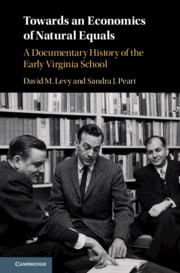Book contents
- Towards an Economics of Natural Equals
- Frontispiece
- Towards an Economics of Natural Equals
- Copyright page
- Dedication
- Contents
- Figures
- Tables
- Preface
- Acknowledgments
- 1 Why the Virginia School of Political Economy Matters
- 2 James Buchanan and the Return to an Economics of Natural Equals
- 3 “Almost Wholly Negative”: An Early Reaction to the Virginia School
- 4 “The Economics of Universal Education” and After: From Friedman to Rawls
- 5 Virginia Political Economy and Public Choice Economics
- 6 The Individuals and Their Connections
- 7 The Role of the Earhart Foundation in the Early Virginia School
- 8 The Virginia School and the Anti-democratic Right
- 9 Neoliberalism, the Virginia School, and the Geldard Report
- 10 Conclusion: Should the Virginia School be Restored?
- Select Bibliography
- Index
3 - “Almost Wholly Negative”: An Early Reaction to the Virginia School
Published online by Cambridge University Press: 16 December 2019
- Towards an Economics of Natural Equals
- Frontispiece
- Towards an Economics of Natural Equals
- Copyright page
- Dedication
- Contents
- Figures
- Tables
- Preface
- Acknowledgments
- 1 Why the Virginia School of Political Economy Matters
- 2 James Buchanan and the Return to an Economics of Natural Equals
- 3 “Almost Wholly Negative”: An Early Reaction to the Virginia School
- 4 “The Economics of Universal Education” and After: From Friedman to Rawls
- 5 Virginia Political Economy and Public Choice Economics
- 6 The Individuals and Their Connections
- 7 The Role of the Earhart Foundation in the Early Virginia School
- 8 The Virginia School and the Anti-democratic Right
- 9 Neoliberalism, the Virginia School, and the Geldard Report
- 10 Conclusion: Should the Virginia School be Restored?
- Select Bibliography
- Index
Summary
In 1960, the Thomas Jefferson Center of the University of Virginia applied for a “massive” grant from the Ford Foundation. Although Buchanan, Nutter, and Coase had all received grants from Ford, it turned down their proposal because of the Center’s unified “point of view.” The chapter examines correspondence and private discussions of the events. Following the submission of their proposal, Buchanan, Nutter, and then-President of UVA Edgar Shannon met with representatives of the Ford Foundation, Tom Carroll and Kermit Gordon. Buchanan concluded that the “reaction of the Ford representatives must be considered to have been almost wholly negative.” The crux of the matter, in Gordon’s assessment, was the TJC’s supposed “single” and dogmatic “point of view,” an ideological perspective purportedly in line with early 1960s Chicago-style economics. Buchanan and his colleagues attempted to dispel this conclusion, arguing that the program focused on market activity as it reflected social consensus. Coase was particularly incensed by allegations of dogmatic ideological narrowness since he had close ties to the socialist Fabian Society.
Keywords
- Type
- Chapter
- Information
- Towards an Economics of Natural EqualsA Documentary History of the Early Virginia School, pp. 41 - 92Publisher: Cambridge University PressPrint publication year: 2020



